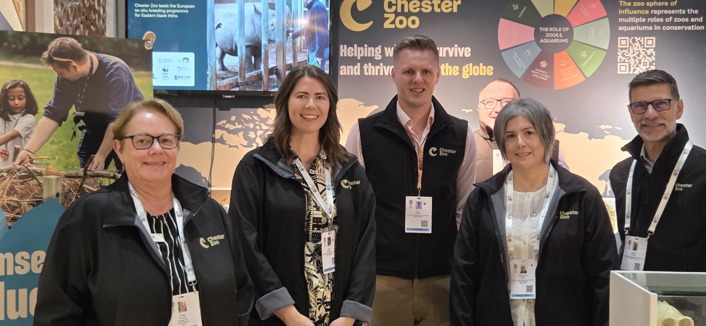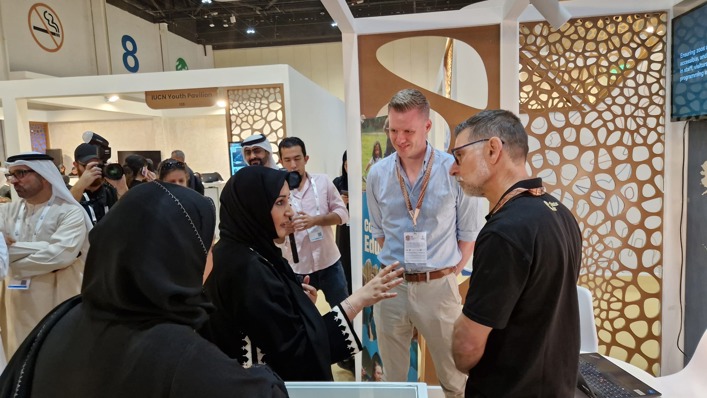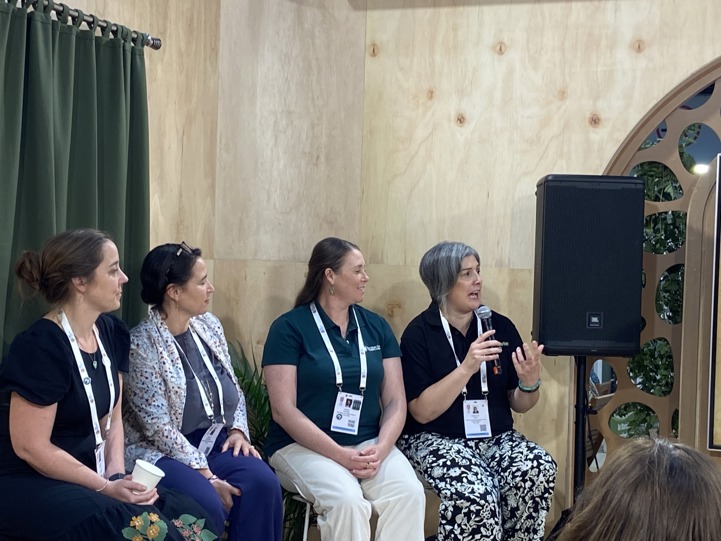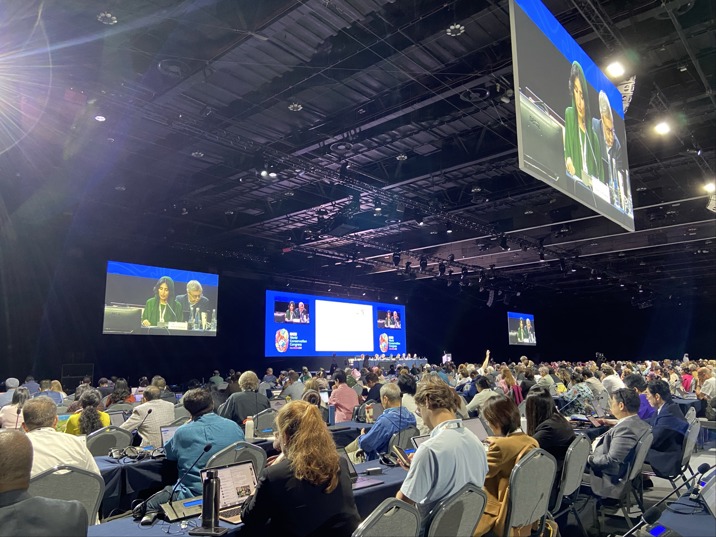
We are helping shape the future of conservation at one of the world's biggest environmental events
A few days on from a whirlwind week in Abu Dhabi, our experts have had a chance to reflect on their time at the IUCN World Conservation Congress – perhaps the most significant event in the conservation calendar.
The International Union for Conservation of Nature is the biggest and oldest environmental organisation of its kind in the world.
It is immensely influential in conservation, and is responsible for maintaining the Red List, where the threat statuses of species are evaluated and listed, guiding conservation actions across the world.
The IUCN congress, which takes place every four years, brings together over 10,000 global leaders, scientists, conservation NGOs like Chester Zoo, indigenous leaders, business representatives and decision makers to address the urgent challenges facing nature and wildlife.

The delegation (left to right): Sue Walker, Head of Science, Jane Absalom from the Conservation Education and Engagement department (CE&E), Rob Comley from the Public Affairs team, Sean Dick Senior CE&E Manager, Charlotte Smith, CE&E Director, and Simon Dowell, Conservation Advisor at Chester Zoo.
We have been a proud member of the IUCN for many years, playing a role shaping its policy through our voting rights and by sitting on various specialist groups within the organisation to support specific conservation actions.
As we increasingly engage with the conservation sector, we decided to send a full delegation to actively participate in the Congress for the first time. We also had a presence at a booth which provided a hub for our activities at the conference, and as a meeting-place for the people we connected with, which included Dr, Amna bint Abdullah Al Dahak, the Minister of Climate Change and Environment for the United Arab Emirates.

The Congress was more than a networking opportunity for conservationists. The team participated in panel talks, took part in policy workshops, facilitated and delivered education sessions and engaged with hundreds of visitors at the Chester Zoo booth. Head of Science Sue Walker met with representatives from other zoos to launch a major cryopreservation partnership.
Simon Dowell, as the designated delegation lead and voting member for Chester Zoo attended the Assembly, which is where the representatives of the over 1400 members of the Union elected the members of IUCN Council for the next four years and voted on over 140 motions (the mechanism by which members guide IUCN policy) covering a wide range of issues.
The spirit of collaboration and commitment at the Congress is heartwarming and gives me much hope for the future. One of the first votes was to approve an ambitious 20-Year Strategic Vision for IUCN titled Unite for Nature: On the Path to 2045. This pivotal framework presents a collective commitment to protecting our planet’s biodiversity and we will all play a part in helping to realise this exciting vision.
Simon Dowell, Conservation Advisor at Chester Zoo and delegation lead
We were directly involved in sponsoring several motions, including Motion 128, which supports IUCN members in ‘strengthening human-nature connectedness to advance transformative change for nature’. Charlotte Smith engaged with the groups who drafted the text, and the motion was successfully passed.
The congress itself was packed, with thousands of people moving around pavilions, breaking off into workshops and congregating in the main hall. Our delegates were often on-site for 14 hours a day, showcasing the zoo’s education, science and field programmes work.

Charlotte Smith (far right) speaking at a panel event
Having the opportunity to connect in person with leading conservationists has been a real privilege. We were also involved in discussions to create the Global Plan of Action for Education on Biodiversity, participating in a workshop to ensure commitments to education are included in National Biodiversity Strategies and Action Plans as we head towards COP17.
Sean Dick, Senior Conservation Education Manager
Our presence at the Congress highlights the increasingly important role of zoos in conservation.
The delegates centred many discussions around the Zoo Sphere of Influence project, a recently updated holistic model designed to represent the role of conservation zoos in the 21st century.
Pleasingly, as the Zoo Sphere includes a section reflecting on what zoos can do to support indigenous people and local communities, and provide opportunities across age groups, the delegates were pleased to see young people, Indigenous Peoples and businesses well represented at the summit.
The power of partnership and connecting with people in meaningful ways was a common theme of the Congress, with many sessions focused on the rights and voices of Indigenous Peoples and local communities and the importance of youth voice. It was also great to see education and engagement featuring in many of the sessions and conversations.
Charlotte Smith, Director of Conservation Education
Ultimately, the IUCN congress was an opportunity to showcase what we at Chester Zoo, and the wider zoo community, can contribute to global conservation.
Attending an international congress and making the most of it as the delegates did, takes a great deal of time, preparation and financial input. It is only with the support of our visitors, member and donors that we can take part in events like this and help shape the future of conservation policy.

The IUCN Congress assembly hall, where voting takes place
Overall, this Congress was hopeful, energising and productive and we were delighted to be able to play a significant part in it together with our zoo and aquarium colleagues. Being part of this and representing Chester Zoo was a career highlight.”
Simon Dowell, Conservation Advisor at Chester Zoo and delegation lead
